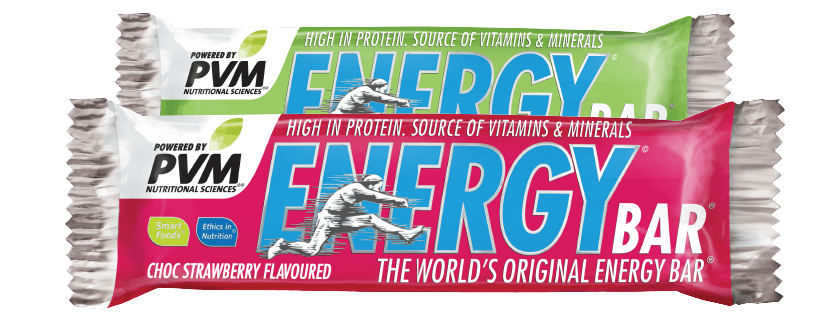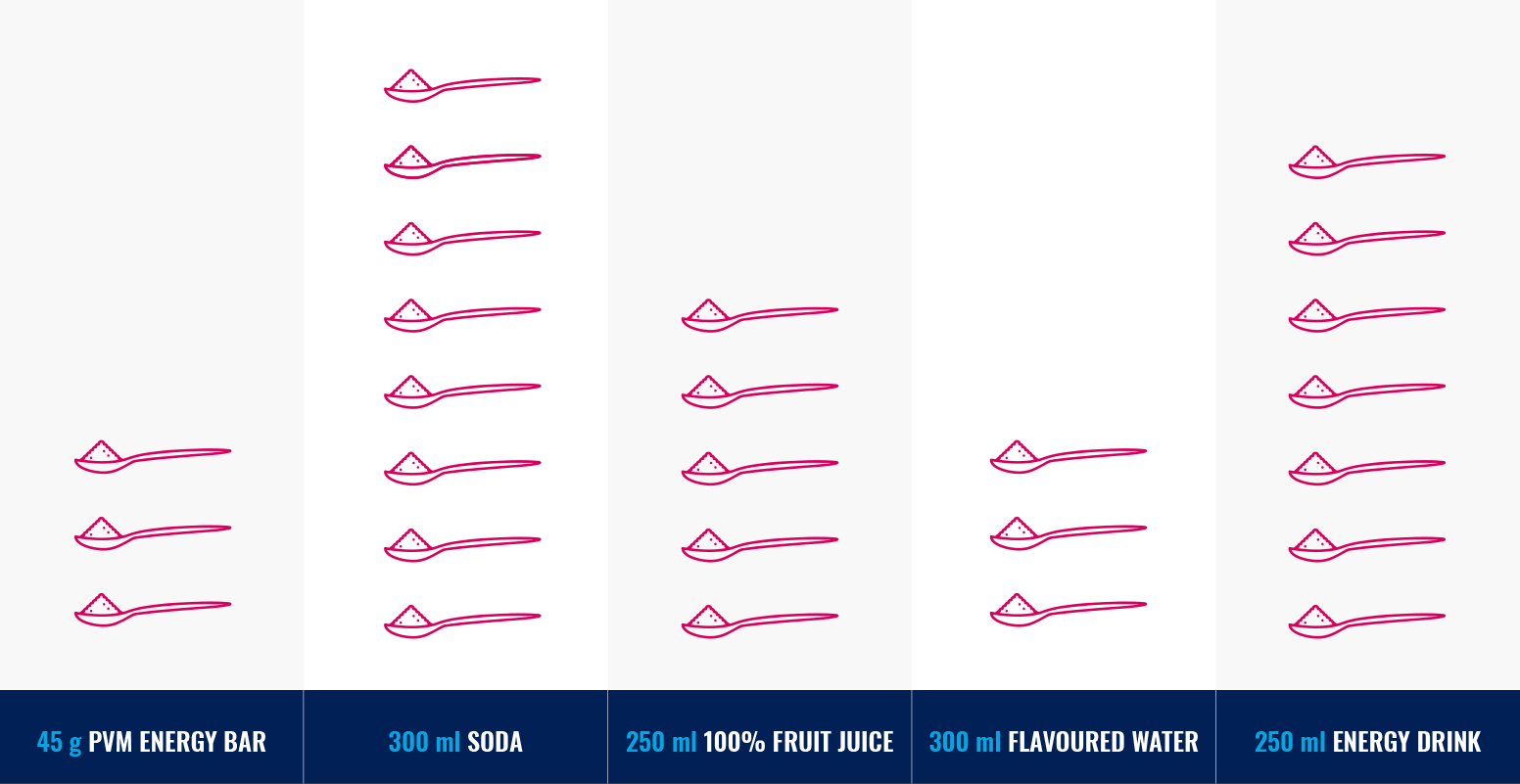SUGARS IN PVM
ENERGY BARS
THE TRUTH
LIFESTYLE FACTORS LIKE SMOKING, ALCOHOL MISUSE,
POOR DIETS AND A LACK OF PHYSICAL ACTIVITY CONTRIBUTE TO THE DEVELOPMENT OF
NON-INFECTIOUS DISEASES.
LIFESTYLE FACTORS LIKE SMOKING, ALCOHOL MISUSE,
POOR DIETS AND A LACK OF PHYSICAL ACTIVITY CONTRIBUTE TO THE DEVELOPMENT OF
NON-INFECTIOUS DISEASES.
A lack of physical activity together with chronic excessive caloric intake will lead to the development of obesity. In contrast to the scientific results, sugar per se is often incorrectly reported in the mainstream media as the main culprit. This oversimplification is as untrue as the “fat-will-kill-you” dogma that prevailed in the 1990’s. What is true though is that a frequent intake of sugar through for e.g. soft drinks, including fruit juices contributes to increased calorie intake, which could be excessive.
Not all carbohydrates including sugars are created equal. Carbohydrates can be divided into simple and complex carbohydrates. Complex carbohydrates are composed of long glucose chains (polysaccharides) also known as starch. Simple carbohydrates have short glucose chains (mono-and disaccharides) and includes sugars such as glucose, fructose, sucrose and lactose to name a few. Sugars naturally occurring in foodstuffs such as fructose in fruits and lactose in milk are also called intrinsic sugars, hence added sugars on labels/ nutritional facts (in some countries) refer to sugars added to products above and beyond the naturally occurring intrinsic sugar.
Labelling regulations in some countries, such as South Africa only specifying total sugar content might therefore
be misleading as this includes both intrinsic-
and extrinsic sugars added.
A lack of physical activity together with chronic excessive caloric intake will lead to the development of obesity. In contrast to the scientific results, sugar per se is often incorrectly reported in the mainstream media as the main culprit. This oversimplification is as untrue as the “fat-will-kill-you” dogma that prevailed in the 1990’s. What is true though is that a frequent intake of sugar through for e.g. soft drinks, including fruit juices contributes to increased calorie intake, which could be excessive.
Not all carbohydrates including sugars are created equal. Carbohydrates can be divided into simple and complex carbohydrates. Complex carbohydrates are composed of long glucose chains (polysaccharides) also known as starch. Simple carbohydrates have short glucose chains (mono-and disaccharides) and includes sugars such as glucose, fructose, sucrose and lactose to name a few. Sugars naturally occurring in foodstuffs such as fructose in fruits and lactose in milk are also called intrinsic sugars, hence added sugars on labels/ nutritional facts (in some countries) refer to sugars added to products above and beyond the naturally occurring intrinsic sugar.
Labelling regulations in some countries, such as South Africa only specifying total sugar content might therefore
be misleading as this includes both intrinsic-
and extrinsic sugars added.

CARBOHYDRATES INCLUDING SUGARS DIFFER IN
TERMS OF HOW THEY ARE METABOLIZED IN THE BODY.
CARBOHYDRATES INCLUDING SUGARS DIFFER IN
TERMS OF HOW THEY ARE METABOLIZED IN THE BODY.
They also differ in terms of their glycaemic response, in other words the impact they have on blood sugar levels. For e.g. fructose
is metabolized almost entirely in the liver and excessive amounts can more easily be used to synthesize fat therefore high amounts of added fructose should be avoided. In contrast fruits containing fructose can be eaten regularly due to the smaller amount of fructose naturally found combined with fibre and other important nutrients, modulating blood glucose levels. Certain complex carbohydrates (starches) like maltodextrin also have a higher glycaemic response compared to sucrose and fructose. It is therefore a myth that starches and not sugars, should be the preferred source of carbohydrates under all circumstances.
They also differ in terms of their glycaemic response, in other words the impact they have on blood sugar levels. For e.g. fructose
is metabolized almost entirely in the liver and excessive amounts can more easily be used to synthesize fat therefore high amounts of added fructose should be avoided. In contrast fruits containing fructose can be eaten regularly due to the smaller amount of fructose naturally found combined with fibre and other important nutrients, modulating blood glucose levels. Certain complex carbohydrates (starches) like maltodextrin also have a higher glycaemic response compared to sucrose and fructose. It is therefore a myth that starches and not sugars, should be the preferred source of carbohydrates under all circumstances.
The combination of protein, fat, carbohydrates and fibre also affects the glycaemic response. The combination of the nutrients decreases/modulates the increase in blood sugar levels. Hence proteins, fats and fibre as a rule prevents a rapid rise in blood sugar levels that is associated with consuming a high glycaemic sugar such as glucose (with a high glycaemic response) on its own.
The combination of protein, fat, carbohydrates and fibre also affects the glycaemic response. The combination of the nutrients decreases/modulates the increase in blood sugar levels. Hence proteins, fats and fibre as a rule prevents a rapid rise in blood sugar levels that is associated with consuming a high glycaemic sugar such as glucose (with a high glycaemic response) on its own.
Sugars may be regarded as non-essential for a healthy diet. However this is not the whole truth. Approximately 200 monosaccharides exist in nature. Eight are commonly found in glycoproteins (simply described as a protein with a sugar group attached). It is thought that these sugars can be synthesized from glucose in the body. We know now that is not completely true. Large individual variation exists in this synthetic ability and supplementation may be required. Furthermore, athletes and active individuals require sugars to train and perform optimally. Sugar aids with the absorption of electrolytes in rehydration drinks. Patients in critical care are also given a 5 % glucose drip to help maintain blood sugar levels. It can therefore be said that the intake of sugars are conditionally essential.
Sugars may be regarded as non-essential for a healthy diet. However this is not the whole truth. Approximately 200 monosaccharides exist in nature. Eight are commonly found in glycoproteins (simply described as a protein with a sugar group attached). It is thought that these sugars can be synthesized from glucose in the body. We know now that is not completely true. Large individual variation exists in this synthetic ability and supplementation may be required. Furthermore, athletes and active individuals require sugars to train and perform optimally. Sugar aids with the absorption of electrolytes in rehydration drinks. Patients in critical care are also given a 5 % glucose drip to help maintain blood sugar levels. It can therefore be said that the intake of sugars are conditionally essential.
THE MAIN BENEFITS OF THE PVM
ENERGY BAR INCLUDES:
1
PVM ENERGY BARS
are formulated to provide a
balanced portion controlled
(45 g) snack to prevent excessive
caloric intake.
2
PVM Energy Bars are formulated
to contain the protein, carbohydrate
and fat ratio as recommended
by the dietary guidelines of the
Institute of Medicine (IOM).
3
The Carbohydrates found in
the Energy Bars include:
1. Lactose (slow releasing)
found naturally in milk powder.
2. Sucrose (Intermediate releasing)
3. Maltrose (Fast releasing)
4
PVM Energy Bars also contain
*slow, intermediate and fast
releasing carbohydrates and
combined with the protein
and fat, supplies instant and
sustained energy and maintains
blood glucose levels.
A PVM ENERGY BAR CONTAINS 7 g LACTOSE AND ONLY
13 g ADDED SUGAR, THEREFORE ±3 TEASPOONS OF
ADDED SUGAR WITH HIGH QUALITY PROTEIN,
VITAMINS AND MINERALS
A PVM ENERGY BAR CONTAINS 7 g LACTOSE AND ONLY
13 g ADDED SUGAR, THEREFORE ±3 TEASPOONS OF
ADDED SUGAR WITH HIGH QUALITY PROTEIN,
VITAMINS AND MINERALS
Below is a comparison of how the added sugars found in
sweetened beverages compares to a PVM Energy Bar.
sweetened beverages compares to a PVM Energy Bar.

*According to the South African Glycaemic Index & Load Guide.
